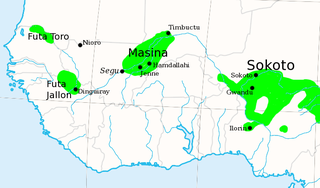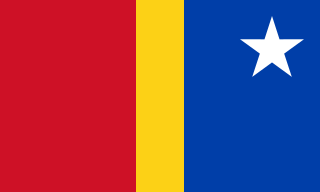Shehu Usman ɗan Fodio was a Fulani scholar, Islamic religious teacher, revolutionary and a philosopher who founded the Sokoto Caliphate and ruled as its first caliph. After the successful revolution, the "Jama'a" gave him the title Amir al-Mu'minin. He rejected the throne and continued calling to Islam.
Hausa–Fulani are people of mixed Hausa and Fulani origin. They are primarily found in the Northern region of Nigeria, most of whom speak a variant of Hausa or Fula or both as their first language.

Sokoto is a major city located in extreme north-western Nigeria, near the confluence of the Sokoto River and the Rima River. As of 2006, it has a population of over 427,760. Sokoto is the modern-day capital of Sokoto State and was previously the capital of the north-western states. Modern Sokoto is known for trading sheepskins, cattle hides, leather crafts, kola nuts and goatskins.

The Sokoto Caliphate, also known as the Sultanate of Sokoto, was a Sunni Muslim caliphate in West Africa. It was founded by Usman dan Fodio in 1804 during the Fulani jihads after defeating the Hausa Kingdoms in the Fulani War. The boundaries of the caliphate are part of present-day Cameroon, Burkina Faso, Niger, and Nigeria. By 1837, the Sokoto state had a population of around 10-20 plus million people, becoming the most populous empire in West Africa. It was dissolved when the British, French and Germans conquered the area in 1903 and annexed it into the newly established Northern Nigeria Protectorate, Senegambia and Niger and Kamerun respectively.
Muhammadu Bello was the second Caliph of Sokoto and reigned from 1817 until 1837. He was also an active writer of history, poetry, and Islamic studies. He was the son and primary aide to Usman dan Fodio, the founder of the Sokoto Caliphate and the first caliph. During his reign, he encouraged the spread of Islam throughout the region, increasing education for both men and women, and the establishment of Islamic courts. He died on October 25, 1837, and was succeeded by his brother Abu Bakr Atiku and then his son, Aliyu Babba.
Muhammadu Yunfa was a king of Gobir, a city-state in Hausaland in what is now Nigeria. He was the son of a Sultan of Gobir Nafata. He is particularly remembered for his conflict with Islamic reformer Shaikh Usman dan Fodio.
The Battle of Tsuntua, fought in December 1804, was one of the largest battles of the Fulani War.

Gobir was a city-state in what is now Nigeria. Founded by the Hausa in the 11th century, Gobir was one of the seven original kingdoms of Hausaland, and continued under Hausa rule for nearly 700 years. Its capital was the city of Alkalawa. In the early 19th century elements of the ruling dynasty fled north to what is today Niger from which a rival dynasty developed ruling as Sarkin Gobir at Tibiri. In 1975 a reunited traditional sultanate took up residence in Sabon Birni, Nigeria.
Degel is a town in northern Nigeria.
Alkalawa was the capital of the Hausa city-state of Gobir, in what is now northern Nigeria.
Abdullahi ɗan Fodio, was a prominent Islamic scholar, jurist, poet and theologian, and the first Amir of Gwandu and first Grand Vizier of Sokoto. His brother, Usman dan Fodio (1754–1817) was the founder of the Sokoto Caliphate. Usman, being more of a scholar than politician, delegated the practical regency of the western part of his empire to Abdullahi and the eastern part to his son Muhammed Bello, who later became the Sultan of Sokoto after his father.
Sarki Nafata of Gobir, one of a series of rulers of the small Hausa state of Gobir, today in northern Nigeria is best remembered for his opposition to Fulani Islamic reformer Usman dan Fodio, who later led a popular uprising against the Gobir rulers, and established the Sokoto Caliphate.

The Fulajihads sometimes called the Fulani revolution were a series of jihads that occurred across West Africa during the 18th and 19th centuries, led largely by the Muslim Fula people. The jihads and the jihad states came to an end with European colonization.
Nana Asmaʾu was a Fula princess, poet, teacher, and a daughter of the founder of the Sokoto Caliphate, Usman dan Fodio. She remains a revered figure in northern Nigeria. She is held up by some as an example of education and independence of women possible under Islam, and by others as a precursor to modern feminism in Africa.

The Kano Emirate was a Muslim state in Northern Nigeria formed in 1805 during the Fulani jihad when the Muslim Hausa-led Sultanate of Kano was deposed and replaced by a new emirate which became a vassal state of the Sokoto Caliphate. During and after the British colonial period, the powers of the emirate were steadily reduced. The emirate is preserved and integrated into modern Nigeria as the Kano Emirate Council.

The Bauchi Emirate was founded by Yaqubu dan Dadi in the early 19th century in what is now Bauchi State, Nigeria, with its capital in Bauchi. The emirate came under British "protection" in the colonial era, and is now denoted a traditional state.

The Battle of Gawakuke was an engagement fought between the Sokoto Caliphate and the Gobir city-state at Gawakuke in northern Nigeria on 9 March 1836. The battle was a victory for Sokoto, and secured the Gobir kingdom's subordination to the caliphate.
Ali Jedo, was the first Amir al-jaish al-Islam of the Sokoto Caliphate. Prior to the jihad, he was the leader of the Fulbe of Konni in modern-day Sokoto State.
The Revolt of Abd al-Salam was a rebellion against the Sokoto Caliphate, driven by perceived bias against the Hausawa. The revolt was led by Mallam Abd al-Salam, a Hausa scholar who had been among the leaders of the Sokoto Revolution that led to the establishment of the caliphate. As time went on, he grew disillusioned with the rewards he received compared to other leaders, many of whom were of Fulbe ethnicity.







